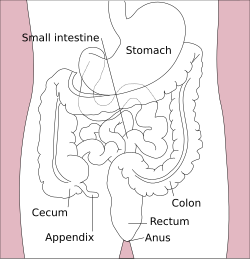Bowels
| Human gastrointestinal tract | |
|---|---|

Diagram of stomach, intestines and rectum
|
|
| Details | |
| System | Digestive system |
| Latin | Tractus digestorius (mouth to anus), canalis alimentarius (esophagus to large intestine), canalis gastrointestinales (stomach to large intestine) |
|
Anatomical terminology
[]
|
|
Gastrointestinal is an adjective meaning of or pertaining to the stomach and intestines. A tract is a collection of related anatomic structures or a series of connected body organs.
The gastrointestinal tract (digestive tract, GI tract, GIT, gut, or alimentary canal) is an organ system within humans and other animals which takes in food, digests it to extract and absorb energy and nutrients, and expels the remaining waste as feces and urine. The mouth, oesophagus, stomach, and intestines are part of the human alimentary canal.
All bilaterians have a gastrointestinal tract, also called a gut or an alimentary canal. This is a tube that transfers food to the organs of digestion. In large bilaterians, the gastrointestinal tract generally also has an exit, the anus, by which the animal disposes of feces (solid wastes). Some small bilaterians have no anus and dispose of solid wastes by other means (for example, through the mouth).
The gastrointestinal tract contains thousands of different bacteria in their gut flora.
The human gastrointestinal tract consists of the esophagus, stomach, and intestines, and is divided into the upper and lower gastrointestinal tracts. The GI tract includes all structures between the mouth and the anus, forming a continuous passageway that includes the main organs of digestion, namely, the stomach, small intestine, and large intestine. In contrast, the human digestive system comprises the gastrointestinal tract plus the accessory organs of digestion (the tongue, salivary glands, pancreas, liver, and gallbladder). The tract may also be divided into foregut, midgut, and hindgut, reflecting the embryological origin of each segment.
...
Wikipedia
